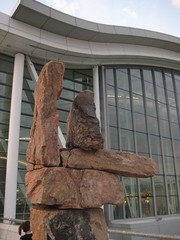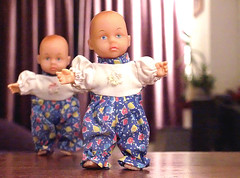Certainly, the Education Journal is not dead! Some folks, though, seem to think that it’s what I believe, or what I want.
[This is an edited version of a comment that I posted this morning on Matthew Tabor’s blog, Education for the Aughts]
 |
| I took this picture at the Toronto Airport the other day. Kinda fits here. |
Matthew sums up my position by saying…
Warlick’s question rests on the assumption that education blogs are a necessary and irreplaceable part of education curricula.
This is a fair summary. Then he states, “Simply put, they aren’t.” I disagree, but more on that later. Then he writes.
I want to know about a professor’s areas of expertise, with whom they’ve studied/collaborated and what they’ve produced. If a professor answers, “I read journals that are peer-reviewed and based on solid scholarship,†I find that a credit to them.
Hey, me too! In fact, I think that it is reasonable to assume that any college instructor is keeping up with the latest in the literature of their field. As a student, who wants to perform well, it would serve me to know what journals are read by my teacher. But Matthew continues later in his post…
Warlick might as well say, “Why would I want an educator who knows how to buy a paper-based journal, open it with his hands and read it when I could have one who knows how to click a Firefox icon, type in a URL and read that?â€
I’m not sure why people seem to assume that if one advocates one thing that it necessarily means the rejection of another. The fact is that Matthew demonstrates, through his disagreement with my article, the value of an immature publishing scheme. The casualness of the medium makes it difficult to present a complete scenario for a position. But, it is what’s not said that leads to conversations (like this) where fuller understanding and even new and valuable ideas can be found or even grown. I’ll be presenting at a staff development institute this week, here in North Carolina, where farming is the theme of the event. Not sure what I’ll be wearing to match the theme, but I suspect that I’ll talk about how today’s information landscape is like farming. We have fertile ground to cultivate. There are rocks, and clay, and even weeds that suck nutrients out of the soil. But the blogosphere can be cultivated by skilled information workers through reading, thinking, writing, and conversing — and I believe that this act of cultivating content in the edublogosphere is critical to any education leader, espcially education professors. When I started teaching, I had no reason to believe that my job would change in any substantial way for the next 30 or 35 years. In that professional circumstance, the occasional research-based and vetted article directly applicable to what and how I taught was sufficient. But today, we are working in
- a new and rapidly evolving economic, social, and political environment,
- with students who enjoy an outside the classroom information experience that often far exceeds that of their classrooms in depth and richness, and
- an information landscape that has changed what it means to be literate.
I believe that a profession that is challenged to adapt to such dramaticaly shifting conditions must engage in conversations — must be willing to cultivate new ground. I think it’s part of why blogging has become so successful, because people need new ground, new ideas, new conversations. Perhaps it’s out of the blogosphere that new directions in formal education literature might come. So, again, I’d ask what journals my education instructor is reading, if it hasn’t already been stated or implied from the syllabus, and I’d ask what blogs they are reading, to learn what conversations they are engaged in. If I and other students read the same blogs, it might make for some valuable new conversations in class. Thanks, sincerely, for continuing the conversation, Matthew.




 For several years, I have sought to make a case for a broader definition of literacy skills, and, consequently, to promote learning environments and experiences that demand these skills — as learning literacies. It became clear, while in Portland, that the case has been made, the “Why” has been answered. Many of the talks and demonstrations were centered around the economic realities of our times and the inadequacies of today’s basic skills. Yet in every conversation that followed, it became increasingly clear that the case is made. Leadership is convinced. Certainly many influential people remain doubtful. Some aren’t even asking the question. But the time has come for us to focus our attentions and our creativity to the “What” and the “How.”
For several years, I have sought to make a case for a broader definition of literacy skills, and, consequently, to promote learning environments and experiences that demand these skills — as learning literacies. It became clear, while in Portland, that the case has been made, the “Why” has been answered. Many of the talks and demonstrations were centered around the economic realities of our times and the inadequacies of today’s basic skills. Yet in every conversation that followed, it became increasingly clear that the case is made. Leadership is convinced. Certainly many influential people remain doubtful. Some aren’t even asking the question. But the time has come for us to focus our attentions and our creativity to the “What” and the “How.” 
